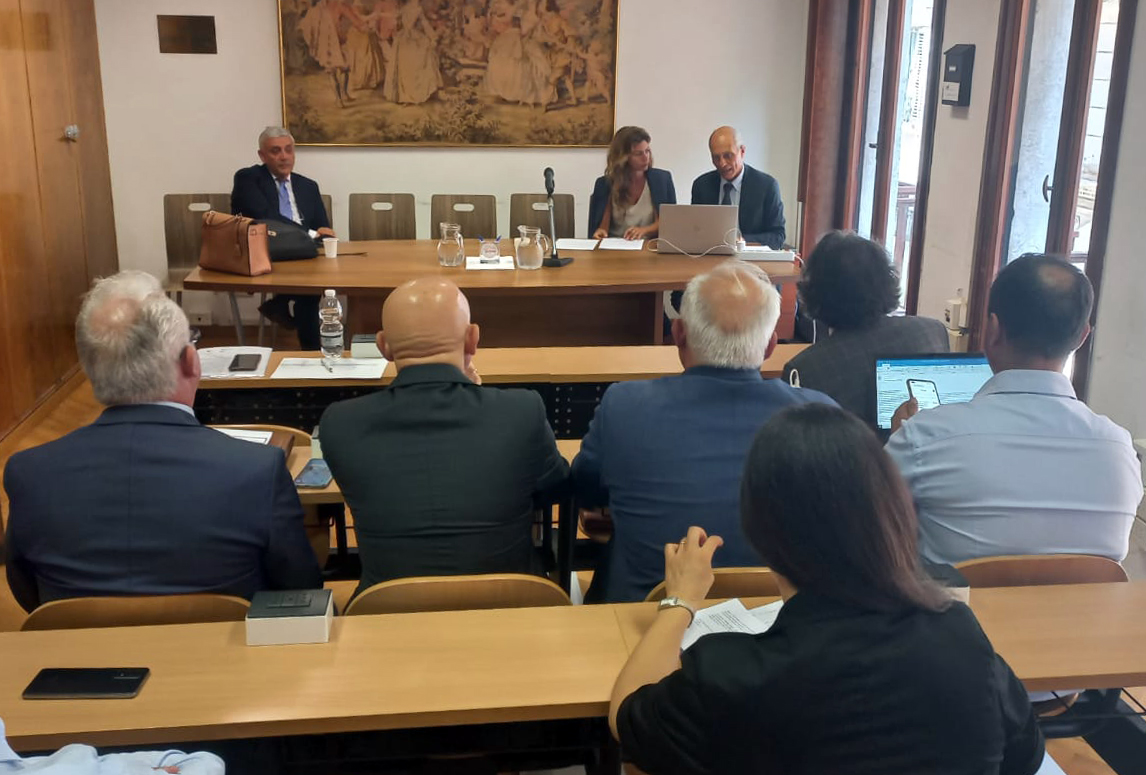During the press conference in Rome, at the “Angelici/Serra” multimedia room of the Roman Press Association, first floor piazza della Torretta 36, organized by the Aerospace District of Sardinia (DASS), in collaboration with the Centre for Research, Development and Advanced Studies in Sardinia (CRS4), University of Cagliari, the Italian Aerospace Research Centre (CIRA), ALI Consortium, Avio and Lead Tech, the Space manufacturing in-situ project, recently funded by the Ministry for Universities and Research (MUR) with four million euro, has been presented.
The project’s objective is to define a mission for the transfer to the surface of Mars of suitable apparatuses for the in-situ production of physical assets to support future settlements on the red planet.
To reach such goals, the activities include the exploitation of key space technologies, such as launch systems, propulsion systems, and innovative thermal protection systems in the ditching phase, as well as the development of apparatuses for the production of structural elements that can take advantage of the materials available on the Martian soil.
Christian Solinas, Sardinia Region President: “With CRS4 and the Aerospace District of Sardinia, Sardinia confirms its leading role in research, high technology and innovation at national and international level. Imagining and implementing innovative solutions that will impact our lives to make them better, projecting them into the future today, is a challenge we are committed to. Growth, knowledge, innovation, and research are now fundamental issues of new development processes that affect not only our planet but also space, and which see Sardinia capable to assert its role as a leader in the creation of a new sentiment and a stronger scientific awareness”.
Giacomo Cao, President of the Aerospace District of Sardinia and Sole Director of CRS4: “The patent, wholly owned by DASS, related to the process for the fabrication of structural elements to support future settlements on Mars, which will be taken into consideration within the framework of the project, was granted some ten years ago in Europe, China, the United States of America, Russia, Japan and India, and is also considered positively by the ISECG - International Space Exploration and Coordination Group - a cluster comprising all the world’s main space agencies. The project funded by MUR makes it possible to effectively follow up a broader proposal called ‘Small mission to Mars’ that is already under consideration by the Interministerial Committee for Space and Aerospace Research Policies (Comint) and the Italian Space Agency”. Cao concludes: “It is a mission that aims to launch a suitable payload entirely designed and built in Italy to the surface of Mars by 2031, inside which specific scientific and technological apparatuses will be housed. The VEGA E launch vehicle, managed by the Avio company, will also be Italian, thus guaranteeing the concrete feasibility of a launch into space without having to rely on third countries. The mission relies on the scientific responsibility of the undersigned, the technical coordination of the Italian Aerospace Research Centre - CIRA, and the participation of the Aerospace Districts of Campania and Sardinia, along with their respective shareholders, as well as companies and institutions such as the National Institute of Astrophysics (INAF), ALI Consortium, the Milan Polytechnic and Telespazio”.
Francesco Mola, Cagliari University Rector: “Our University has always supported its researchers’ work in many different fields, including aerospace. We do believe that the project, in which we are involved, is really important, therefore we are proud to be able to give our contribution to a challenge of such great impact for the international scientific community”.
Antonio Blandini, CIRA President: “This project represents an important challenge in creating the necessary conditions for human life in space and on other planets. CIRA intends to make available all its expertise to carry out this ambitious mission and enable Italy to take on a leading role in the sector. Our Centre is working on several fronts to ensure easier access to space, a safe re-entry not only into the Earth’s atmosphere, but also in that of other planets and is also equipping itself with an integrated test infrastructure for the qualification of systems and technologies for the human and robotic exploration and colonization of Moon and Mars”.
Francesco Punzo, ALI Chief Operating Officer (COO): “Our contribution to the mission concerns the extremely delicate phase of descent onto the red planet and the protection of scientific payloads. To enable a safe landing, ALI will use the proprietary re-entry technology called IRENE (Italian RE-entry NacellE), which presents simplicity characteristics that not only significantly reduce the risks but also mission costs. The unique configuration of the heat shield, which is deployed like an umbrella during the final stages of the mission, and also manages to considerably slow down the probe, avoiding or at least minimizing the need to equip the re-entry module with additional, more complex braking systems that are more prone to failures or errors. The IRENE technology - Punzo concludes - has already been validated with a suborbital test on November 22, 2022. The orbital test, on the other hand, is scheduled between December 2024 and July 2025”.
Arturo Moccia, Lead Tech srl CEO: “The Lead Tech contribution to the SMS project, will consider the activities previously carried out by the other Partners and consist in the construction of the demonstrator to test and validate the final solution. In particular, the model will verify the ability of a future flight demonstrator to carry out some important functionalities. The activities will aim to demonstrate the representativeness of the model in terms of mechanical interfaces, mass and shape and its connection with the launcher.
Lead Tech has already participated in the design and construction of the flight model of the Mini IRENE Capsule, which was validated in a suborbital flight in November 2022. The Lead Tech’s participation in the SMS project will be a further stimulus for company growth in the Space sector”.



